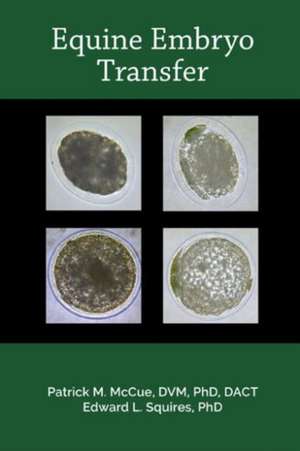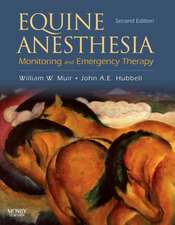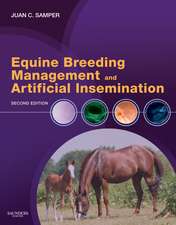Equine Embryo Transfer
Autor Patrick M. McCue, Edward L. Squiresen Limba Engleză Paperback – 18 feb 2015
Preț: 437.94 lei
Preț vechi: 476.03 lei
-8% Nou
Puncte Express: 657
Preț estimativ în valută:
83.83€ • 91.08$ • 70.46£
83.83€ • 91.08$ • 70.46£
Carte disponibilă
Livrare economică 01-15 aprilie
Livrare express 15-21 martie pentru 26.85 lei
Preluare comenzi: 021 569.72.76
Specificații
ISBN-13: 9781591610472
ISBN-10: 1591610478
Pagini: 184
Ilustrații: 132 colour illustrations
Dimensiuni: 152 x 229 x 10 mm
Greutate: 0.34 kg
Ediția:1
Editura: Teton New Media
Colecția Teton New Media
ISBN-10: 1591610478
Pagini: 184
Ilustrații: 132 colour illustrations
Dimensiuni: 152 x 229 x 10 mm
Greutate: 0.34 kg
Ediția:1
Editura: Teton New Media
Colecția Teton New Media
Public țintă
Academic and PostgraduateRecenzii
"... a well-written book. It covers everything involved in equine embryo transfer work from start to finish. The book is written in a manner that will provide valuable information to anyone interested in learning embryo transfer or someone who is already doing some embryo transfer but would like more information. ... I particularly liked the pictures and charts, because they nicely complimented and augmented the text. This book also contains a lot of descriptive statistics for a large number of embryo transfers. It is a good value and will be a nice addition to the library of anyone interested in equine embryo transfer."
—Shawn Jensen, DVM, Bluff Country Equine, Winona, Minnesota, USA, from Vet Med Today: Book Reviews, JAVMA, Vol 247, No. 6, September 15, 2015
—Shawn Jensen, DVM, Bluff Country Equine, Winona, Minnesota, USA, from Vet Med Today: Book Reviews, JAVMA, Vol 247, No. 6, September 15, 2015
Notă biografică
Patrick M. McCue, Edward L. Squires
Cuprins
Contents 1. Introduction General Introduction (i.e. what is ET) Advantages and uses of embryo transfer Changes in the ET Industry Breed regulations (include a Table of most major breeds; ET, frozen embryos, etc.) Per cycle ET Success = Embryo Collection Rate (50-60%) x Embryo Transfer Pregnancy Rate (70-80%)Goals of the Manual 2. History of equine embryo transfer Livestock Horses Domestic horses as surrogates for endangered equids(?) 3. Reproductive Anatomy and Physiology of the MareAnatomy of the mare Physiology of the estrous cycle Physiology of early embryonic development and early pregnancy 4. Management of the donor mare Selection of the donor Evaluation of the donor (BSE)Management and Day of breeding (fresh, cooled, frozen semen) Palpation/ultrasound examinations relative to flush; daily vs every 6-8 hrs for frozen semen; BID if goal is to collect a small embryo at day 6.5 for cryopreservation Induction of ovulation (hCG and deslorelin) Donor mare management (PMIE, fluid, etc.)Estrous cycle control (Lights, P&E, PGF, hCG, Deslorelin, Regumate) Allow a mare to carry to term by approximately 10 years of age Allowing mare to carry own every 3-4 years Effect of repeated flushing on uterine health and embryo recovery # flushes per year recommendedFertility of mares after flushing (i.e. same season)Problem mares (i.e. PMIE, etc.) Maiden mares (young vs older)Post partum mares (i.e. flushing on foal heat) 5. SuperovulationHistoryTechniques EFSH Optimal follicle size at onset Problems - same stallion vs. goal of different stallions Not every mare responds to FSHPAF's and HAF's 6. Embryo Collection Equipment (Box Table) Facilities (stocks vs stall, etc.) Procedure; (incl. clean out and wash up) Ultrasound prior to flush in problem
Descriere
This book briefly reviews the history of equine embryo transfer, covering in clinically practical terms the techniques, equipment, and management protocols currently in use.







